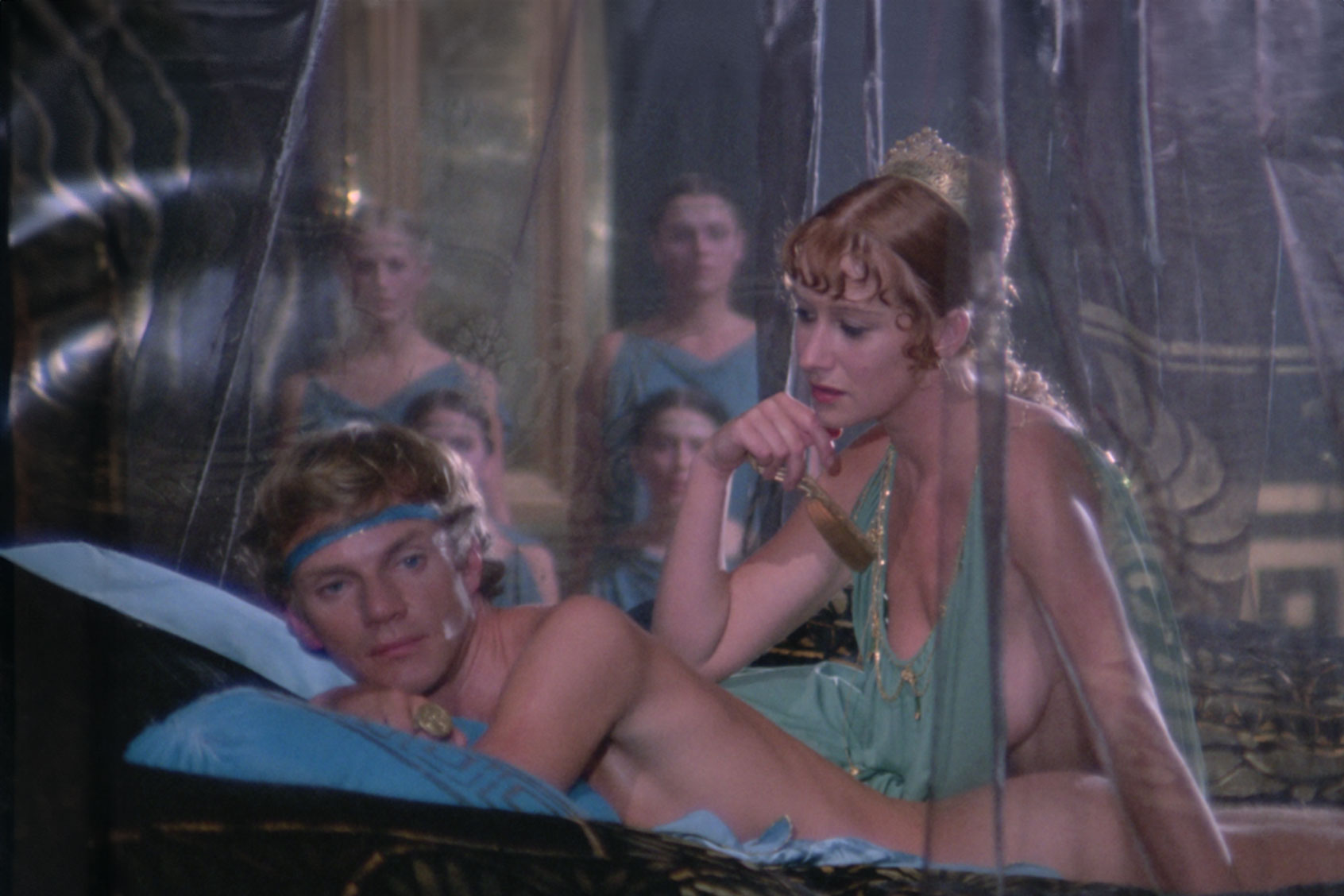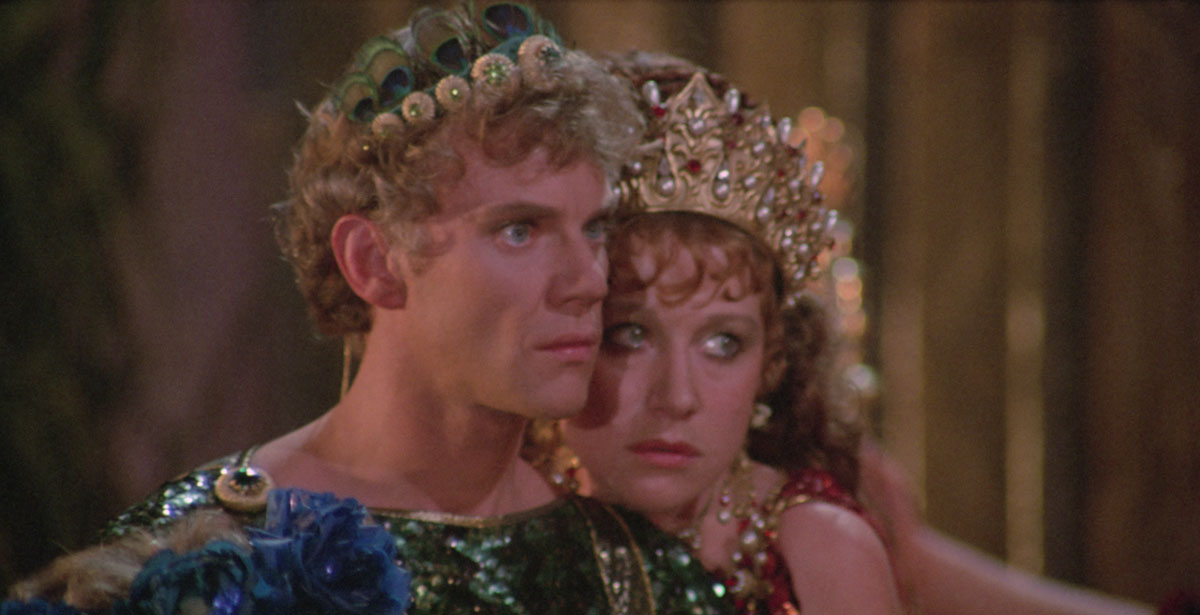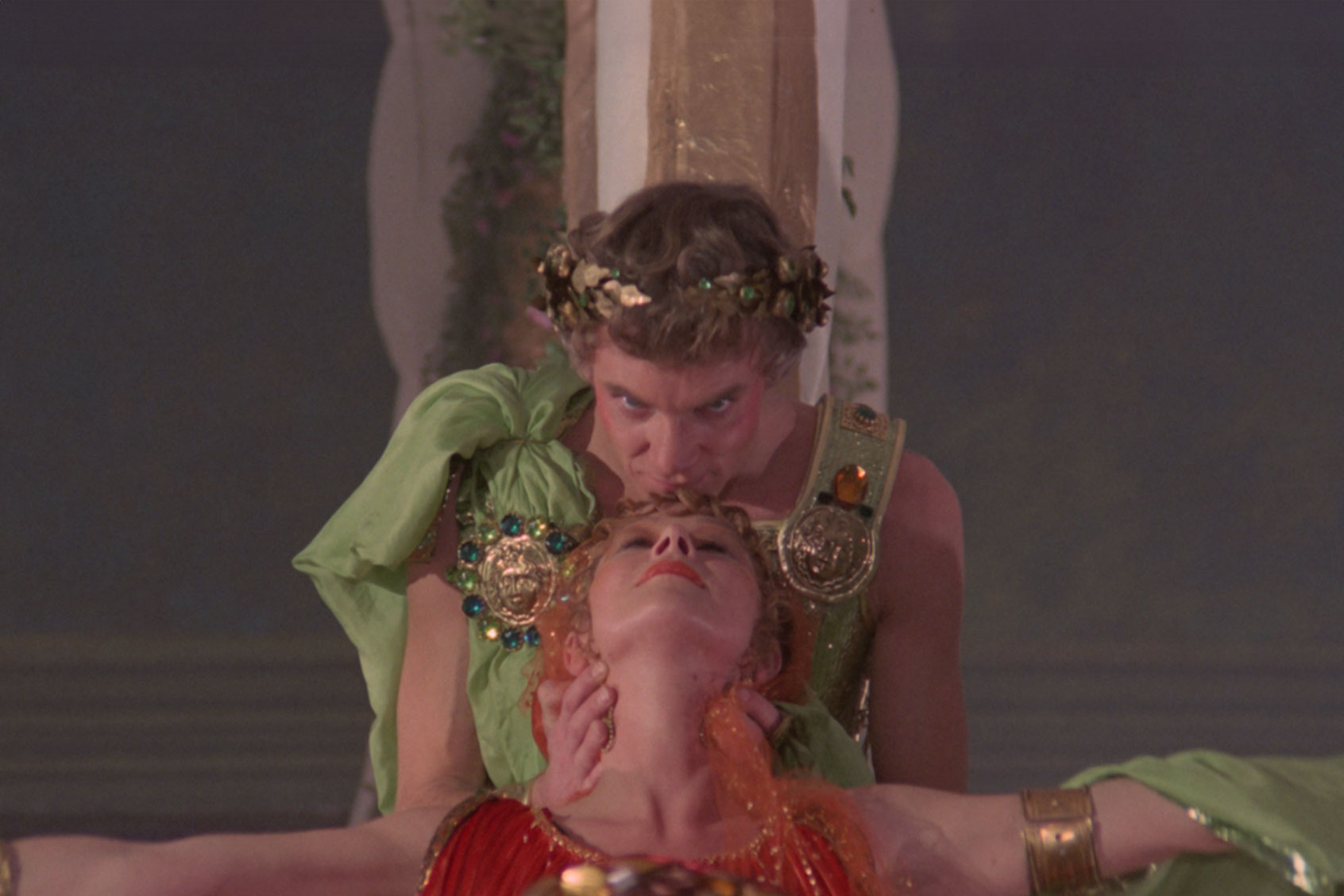The 1979 version of “Caligula” was notorious upon its initial release. An X-rated spectacle featuring a cast of name actors — Malcolm McDowell, Helen Mirren, Peter O’Toole and Sir John Gielgud among them — the film was critically panned and even banned in Russia until 1983 and in Belarus. But it generated significant box office receipts even with all the ill will it received from cast and crew and critics. Several actors from the production even spoke out against the film at the time.
“Caligula” was a troubled production, eventually disowned by director Tinto Brass, who was fired, and screenwriter Gore Vidal, who sued to have his name removed, because producer Bob Guccione, of “Penthouse” fame, inserted hardcore pornography into the film and reedited it. Reportedly, gay scenes Vidal wrote were cut.
Now, more than four decades later, “Caligula: The Ultimate Cut” is being released in theaters in a 4K “reconstruction,” with Blu-ray and VOD to follow. This version, produced by Thomas Negovan, adheres to Vidal’s “original vision” and uses some of the 90 hours of unseen footage to create an engrossing three-hour epic. The film is still chock-full of sex and violence, decadence and madness; it is just more coherent and less tasteless. Nevertheless, it still provides some shock value.
The story concerns Caligula (McDowell) who becomes Emperor of Rome after Macro (Guido Mannari) kills reigning emperor Tiberius (O’Toole). Caligula then has Macro arrested and executed to cover up his own complicity in the assassination. Caligula is also in an intimate relationship with his sister, Drusilla (Teresa Ann Savoy), but is encouraged to marry someone else since incest is not legal except in Egypt. He selects Caesonia (Helen Mirren) as his wife, in part because she is not “discriminating.”
"[Malcolm] McDowell was always very vocal that this was a betrayal of the actors."
As Caligula maintains his power, his megalomania runs amok. He thinks he can do anything he wants because, he believes, he is God in human form. But Caligula has bouts of madness. The film chronicles his bad behavior which includes de-virginizing a couple on their wedding night and enjoying a beheading.
McDowell plays Caligula with an insouciance that is apt for the part. The actor feels his performance in “The Ultimate Cut” is the one he gave, which had been ruined by the original edit. It is certainly worth seeing this “vindication.”
Perhaps it was ahead of its time, but “Caligula” remains a curiosity. To learn more about “Caligula: The Ultimate Cut,” Salon spoke with producer Thomas Negovan about reconstructing the debauchery.
What did you think of the original release of “Caligula”?
I didn’t see it until I was well underway with our edit. My first impression was confusion, because when I watched it, I had seen dozens of hours of footage, and I had read all of the versions of the scripts. So, I knew what the story was supposed to be coming in. I watched it with a copy of the script in my lap, and I was very confused. About 30-45 minutes into it, I had to put the script down because we had gone so far off the map, there was no way to skip back and forth. This script was not going to help me get through this movie.
I do understand now the affection that some people have for [the original “Caligula”] because it is a unique combination of seeing something really swing for the fences while also being like a trainwreck. There is a humorous element to experiencing the film. The sets are incredible, the cast are incredible, but the movie makes no sense.
What did you think of the original film’s notoriety?
This is the most expensive independent film in history. The reason the notoriety has endured is because it’s not just that there is sex in it or that it is a bad film. There’s always that addendum of the rumors that in some universe there is a version of this movie that is just as strange and actually, the bat connects with the ball. It wasn’t just “Oh, there’s this crazy movie.” It was, “They were making this movie, and this guy stole the film.” McDowell was always very vocal that this was a betrayal of the actors, [stating] “We made a good film, and I can’t control what was released.”
The idea that this is a spectacle, I get that. It can still be a spectacle. This movie is bats**t insane. It’s not a tame movie. It’s still bizarre, but instead of McDowell flailing around like a madman, there’s a character arc now. Instead of Helen Mirren being a two-dimensional character for nine minutes, there’s an hour of actual development.
 Caligula: The Ultimate Cut (Drafthouse Films)What prompted you to reconstruct the film?
Caligula: The Ultimate Cut (Drafthouse Films)What prompted you to reconstruct the film?
It was like they opened the doors to the vault and in the course of the conversation, they asked, “Are you going to do this?” and if I said no, those doors would shut for another 50 years. People before me have tried to fund this reconstruction — and it’s not a restoration; we are rebuilding the whole film — and had not been successful. In that moment, I felt the combination of my curiosity and the opportunity to right one of the greatest wrongs that I was aware of in cinema history.
What did the reconstruction process entail?
My creative partner, Aaron Shaps, did the editing part of this. We basically pretended that it was 1976, and it was the end of the production, and Tinto [Brass] hadn’t been fired. Maybe Gore was already angry and walked away. We scanned all of the footage, and I spent the first year just watching footage and reading and listening to every interview on the planet with Gore, [producer] Franco Rossellini, Tinto Brass, Malcolm McDowell and Bob Guccione, and talking to people who worked on the production, the woman who did PR, Bob’s best friend who was on set, et cetera to figure out what each person wanted. I didn’t see my role as coming in and saying, “I’m going to try to do this.” I didn’t have a team. I was looking for where the common ground was in what everyone was saying. Simultaneously, I was taking in all of the footage as if I had been on the set and was aware of what existed.
"The most important thing to me was honoring the arc of Caligula that Malcolm had sculpted."
With all those things, you crack the code of what the story is. At that point, we had to put our own personality into it. I am never going to be Gore or Bob or Tinto. Tinto would have gone much stranger with it. Gore would have hated it in any capacity because he wanted an austere version. And we saw what happened when Bob had his way; it was a debacle. But the real guiding light through this is what the performers did. The biggest part was that the movie that they filmed was closer to a fable or an opera than a traditional historical film. Bob was saying it would be the most historically accurate depiction of ancient Rome that anyone had ever seen. Then in the background there is a three-story decapitation machine and an elevator. How do you not laugh at that? So, you look at modern opera, or a fable, where a story doesn’t need to be true in historical terms. That’s where everything came together. At the end of the day, it was more [Alejandro] Jodorowsky than what was in Brass’ ouvre. But the most important thing to me was honoring the arc of Caligula that Malcolm had sculpted. Everything else was just in service to that.
What about editing to (re)tell the story?
People do ask, “Why did you take this scene out?” If you look at it from the point of view that you are telling the story in three chapters — that he is innocent, then he gets power and then when his sister dies, he is unmoored from reality — he comes to terms with being a character who is transformed into legend. He ascends up the steps. That’s a transcendent moment. It’s a symbolist film. The things people are asking about are more of the spectacle. "Why did you take out the castration scene?" It doesn’t serve his narrative. We already know he’s a monster. Do you need this to be six hours? There are three to four things people will recognize we took out, but there are two dozen we put in that are infinitely more important to the narrative. That’s how we got Helen Mirren’s performance up from nine minutes to 53. I would rather watch Helen and Malcolm arguing for eight minutes than have a 12-minute orgy scene that is not even sexy. Everything was based on the characters and telling the story.
You are a historian. What do you think accounts for our fascination with the history of Caligula, the individual? Gore Vidal extensively researched it hoping to make an honest biopic. Does the 1979 film and/or the 2024 “Ultimate Cut” portray the history accurately, even with the elevator in 37 A.D.?
For me, and for my sensibilities, this is the truest version of Caligula that you can have. You have someone unfettered by limitations on power, who ultimately loses their grip on consensual reality. By the end of the movie, he is echoing all the things Tiberius told him. It’s the cyclical nature of the way history doesn’t repeat, but it rhymes.
Those stories are the truest because the slanted angle we view them from allows them to be more timeless. The fascination we have with Caligula as a character is that we can’t know what color his toothbrush was. Everything written about him was by people who came after him and hated him. He was a boy raised in war camps, who became a beloved emperor and then it all went south. He had a short reign, and he went mad with power and tried to destroy the empire from the top down. The perspective we are giving with this film is anarchistic; he sees corruption in the senate. Caligula is surrounded by sycophants all too willing to put him on the pedestal. When he starts trying to dismantle the empire, it’s in reaction to the corruption. He’s not crazy. But the one person who held him to reality was his sister, and when she dies, his rock is completely gone. When he goes into the sewers, it’s a transformation. He does not care about anything except tearing down this corrupt structure. But he recognizes that he is part of the same cycle of power that has always existed, and always will exist. I think this version of the movie functions as a fable. It’s a dark fairy tale.
The theme of megalomania is kind of prescient now. One cannot help but see parallels between Caligula and a male presidential candidate. In “Caligula,” power makes him feel invincible, people kowtow to his absurd whims, he humiliates anyone who threatens his power, he uses hate and fear to control others, and he has delusions of grandeur about being a God in human form. What are your thoughts about the film’s relevance?
I think the attraction people have to political leaders who are disruptors is the same thing that happens in “Caligula.” People loved Caligula because he spotted the corruption and aimed to destroy that. What is also parallel is that after he went off the rails, he was doing it because he had no discipline and yet wielded infinite power.
Ultimately the end of that story is one of two things. You have what happens with Tiberius — your reign ends, and the cycle starts anew. Or in Caligula’s case, he recognizes that he failed. In the [new] film, he is touching the standards of Rome and sheds a tear because he realizes the empire is more important than him. That’s a huge shift. We don’t see enough of that in modern politics, that we recognize our communities and country are more important than an individual. We have a political climate now where they call [Trump] “Orange Caligula” because he is that. He is off his rocker and will put himself above the country at every moment, which is what Caligula did.
In our version, Caesonia asks, “Why are you taunting them?” Caligula says, “Well I hate them. He asks, “Do you believe I’m a god in human form?” And she says, “Yes,” kind of not sure how to answer him. He says, “Well, you’re as stupid as the rest of them.” He’s just doing anything he can to be a disruptor. I am certain there will be a lot of people who make a lot of parallels to modern politics. I expect if Gore Vidal was here today, he would be saying, “It was true 2,000 years ago, and will likely be true 2,000 years from now.”
"I would rather watch Helen and Malcolm arguing for eight minutes than have a 12-minute orgy scene that is not even sexy."
 Caligula: The Ultimate Cut (Drafthouse Films)The original film was notorious for its orgy scenes, violence and episodes of physical and sexual abuse. How do you think these moments play now? I was aghast to see Caligula leading a woman by a chain around her neck. The de-virginizing sequence was quite shocking, and there is the violent beheading episode. But you removed the castration scene! What are your thoughts about how “Caligula” holds up?
Caligula: The Ultimate Cut (Drafthouse Films)The original film was notorious for its orgy scenes, violence and episodes of physical and sexual abuse. How do you think these moments play now? I was aghast to see Caligula leading a woman by a chain around her neck. The de-virginizing sequence was quite shocking, and there is the violent beheading episode. But you removed the castration scene! What are your thoughts about how “Caligula” holds up?
I think that most mature adults, if not all, will find this version more distressing because of the parallels you mentioned. When the violence does happen, it is happening for a reason to people we understand better. In the Guccione version, everything was done for shock value. The way it was cut together it happened in rapid-fire form with no real thought about why these scenes were sequenced that way. They were there to keep throwing a bucket of ice water in someone’s face. People are stimulated by that. The movie got terrible reviews, but people went to see it. There are very few films that occupy this space. It is unflinching in its approach to sexuality and violence. If people want sex and violence with no plot, you always have the 1979 version to go to.
Want a daily wrap-up of all the news and commentary Salon has to offer? Subscribe to our morning newsletter, Crash Course.
What do you hope audiences will get out of seeing “The Ultimate Cut,” and do you recommend folks comparing it to the original “Caligula”?
If someone is really interested, put both up on your computer screen and watch how a curatorial view can completely change the dynamics of a scene. When Caligula is murdered, in our version, it is very serious and very sad. In the 1979 edit it’s a terrible soap opera, where the guy doesn’t hit the ground no matter how many times he is stabbed. It was the same film set, the same raw materials, just a different vision. As an experiment in that way, there is a validity to exploring them together.
“Caligula: The Ultimate Cut” opening in select theaters Aug. 16-30, with a Limited-Edition Boxed Set/Blu-ray Set/DVD: Sept. 17 and a VOD release Oct. 18.
Read more
about this topic


